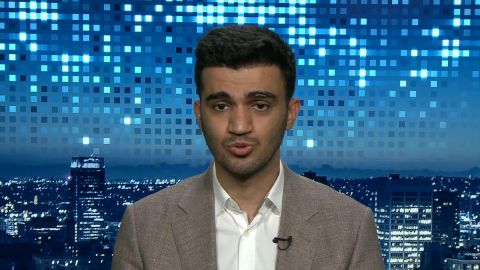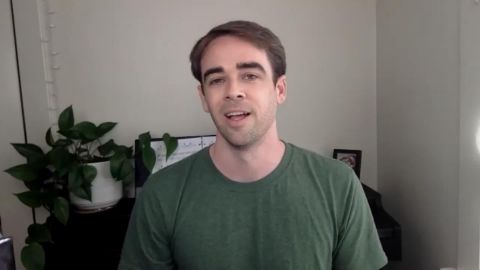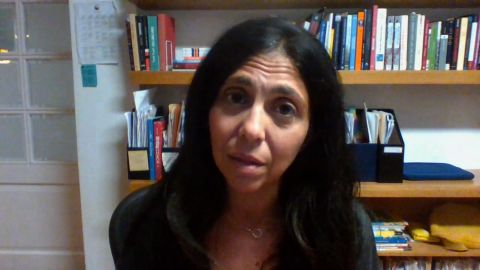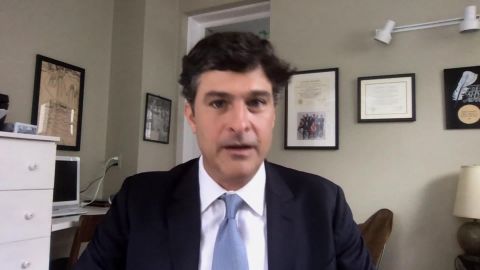Read Transcript EXPAND
CHRISTIANE AMANPOUR: Now, remember the name Theranos, touted as a revolutionary blood testing start-up, until it came crashing down, and its co-founder — or, rather, its founder, Elizabeth Holmes, was charged with fraud in 2018. Tyler Shultz worked at that company, before becoming a whistleblower about the technology which didn’t actually work. In his new podcast, “Thicker Than Water,” he tells his side of the story. Here’s our Hari Sreenivasan talking to Tyler about that and lessons learned when it comes to the hunt for a COVID-19 vaccine.
HARI SREENIVASAN: Christiane, thanks so much. Tyler, thanks for joining us. Now, for our overseas audience who might not have kept up with the story of what Theranos is, I mean, a very thumbnail summary right off the top here. You wanted to build 200 different tests that you would run off of an incredibly very tiny sample of blood. What went wrong at the company?
TYLER SHULTZ, THERANOS WHISTLEBLOWER: Oh, well, where to start?
(LAUGHTER)
SHULTZ: What went wrong is that I think we — I think the ambitions were a little bit too big and the technology wasn’t quite there to back it up. But, really, it was just — it’s a story of vision outpacing reality. And the idea of doing anything that a central laboratory you can do from a single drop of blood in a Walgreens or in an operating room or in a medevac helicopter or in a battlefield is an amazing vision. And Elizabeth was great at selling that vision, but not so great at actually executing on it. And, really, the technology did not exist to enable it.
SREENIVASAN: You’re talking about Elizabeth Holmes, the CEO. And your story, as you tell it in this podcast, is also about how so many of us, the press included, society at large, investors, wanted to believe that something so grand was possible, was here today, but we really didn’t look under the hood until well after patients were already affected.
SHULTZ: Yes, I mean, it was a great story. And everyone loves a good story. And, unfortunately, I think people liked this story so much that they didn’t really question it. There were a lot of systems that had to fail in order for Theranos to become what it was. The investors failed. They didn’t do their due diligence. It’s actually pretty astounding, Elizabeth was able to raise hundreds of millions of dollars, and not a single investor ever saw an audited financial statement, which is pretty mind-boggling. They had a partnership with Walgreens, and they actually hired an expert in laboratory science to go to Theranos and do due diligence on their technology. And they kind of — they wouldn’t show him what it was. So he went back to Walgreens and said, don’t do business with these people. And they ignored him and did business with them anyway. So, there were red flags there, but people were just blinded by this good story.
SREENIVASAN: And, well, what did you do at the company?
SHULTZ: Mostly, at the company, I was doing what was called assay validation where my job was to make sure that the tests were safe and working correctly before we tested actual patients.
SREENIVASAN: And when did you figure out something was off?
SHULTZ: I learned that something was off about four days after I started working there full-time. The biggest red flag at that point was actually seeing the technology. And I was expecting some fancy microfluidic technology and some signal transduction method that I had never dreamed of. But what it was just a pipette inside of a box on a robotic arm. So, it was very rudimentary technology. There was nothing in there that I hadn’t seen before. So, that was the first moment where I kind of went, uh-oh.
SREENIVASAN: What are the consequences of something like Theranos not working when it comes to actual patients’ lives who are basically looking for information from this test? If the test is wrong, what’s the consequence?
SHULTZ: I mean, yes, the consequences can be pretty wide-ranging. When I started really raising my concerns, it was over a syphilis test which I was convinced did not actually work. And we were starting to run that test on real patients. We had made the decision, we’re going to push this to production, we’re going to start running patient samples. And syphilis is a great example of a test where, if you’re told you don’t have it, when you actually do, there are really serious health consequences. One, you can spread it to other people. And then, two, untreated syphilis is no joke. It’s one of those diseases where, if you catch it early and get treatment, it’s really not that big of a deal. But if you’re told you don’t have it, and you go on and live your life and let it grow, it’s — it can be really bad.
SREENIVASAN: And there were actual patients in Arizona that were going to Walgreens and giving their blood.
SHULTZ: Yes, there were actual patients who were using this. And we were running tests for HIV, for hepatitis C. I think we had a fertility panel. So, yes, maybe women were told they maybe lost their baby when they hadn’t, or maybe they were pregnant when they weren’t. So, there are all kinds of potential bad outcomes. I know, particularly, that our potassium test did not work very well. And I remember one instance when I was at Theranos where a patient got tested for potassium, and the result was so far out of range, that that person should have been dead. So, the technician actually called the patient and said, you have to go to the emergency room immediately. And upon retesting, there was nothing wrong with her.
SREENIVASAN: Listening to your podcast, I wondered — you’re really describing red flags almost from day one. Obviously, you have the benefit of hindsight now.
SHULTZ: Yes.
SREENIVASAN: But there were so many moments in the story where I hear you saying, well, that didn’t sound right. That doesn’t sound right. I wondered, what kept you going back? What is it that made you want to go back to work, knowing that you were leaving a lab and you were working with equipment that was not performing anywhere close to how it was being sold?
SHULTZ: Yes, so there were a couple of things. One, I was a huge believer in Elizabeth, and it was really hard for me to reconcile the differences between what I was seeing and what Elizabeth was telling me. And it is really strange, looking back, to see kind of like the power she had or the influence she had over the way people thought, including on myself. You know, in this Audible, I describe Halloween at Theranos, where, at that point, I had been there about two months, and I had seen tons of red flags, but I still dressed as a nanotainer for Halloween, because I was still drinking the Kool-Aid that badly. I wanted it to work. I wanted to be part of the vision. I wanted to be part of this company. And it’s like, when I when I listen back to that part of the audio book — or the Audible, I just kind of like shake my head, like, man, what was I doing? I was still kind of like sucking up to Elizabeth.
SREENIVASAN: There were instances about the culture and the climate that you’re working under that were a little scary at times. What kind of surveillance, for example, were you under while you were working there? What did the employees know about who was watching or how they were being watched?
SHULTZ: Yes, so, most people actually had kind of Post-it notes that they would stick over their — the camera on their computer, because they thought that Sunny, the president of the company, was watching people through the Webcams and seeing when people were working or weren’t working. Every door was — you know, had video monitors, but that’s not all that unusual.
SREENIVASAN: No.
SHULTZ: But when I did — so there’s one part where I smuggle out a stack of e-mails. And I didn’t want the security cameras to see me walking out with a stack of papers. So I just put them straight under my shirt, put my head down and walked out the door, so the cameras wouldn’t see me taking papers out of the building.
(LAUGHTER)
SREENIVASAN: When did you decide it was time to speak up? And how did you do that?
SHULTZ: So, I started speaking up after I started seeing many, many more red flags. And that was probably five to six months later that I actually started raising my concerns.
SREENIVASAN: And then you really — you went to the press. I mean, you were not an open source for quite some time. But was that a more effective route to get the government’s attention?
SHULTZ: Yes, it was absolutely the most effective route. I confronted the CEO, the president, a board member. I reached out to the government. None of that did anything. The only thing that worked was talking to a “Wall Street Journal” reporter. And I think it just — it comes down to, the government has just way too much to look at. And they may not really be aware of what’s happening until it appears in “The Wall Street Journal.” And I also think that our government responds to the collective consciousness of the people, as they should. So, when people are outraged, the government should act.
SREENIVASAN: So, now you’re talking secretly to “The Wall Street Journal.” The Theranos lawyers are after you because they think you’re giving up trade secrets, your lawyers, their lawyers going back and forth. You’re concerned about being taken to court and sued. You can’t talk to your friends or your family about this, because then that implicates them. During all this, in your story, you say that your mental health suffered, to such a point that you were contemplating taking your own life. Why?
SHULTZ: Just — it was — it was just so tough. I — every morning, I woke up and just felt like it was the worst day of my life. And I was right. Every morning I woke up and it was again the worst day of my life, just the worst day of your life on Groundhog Day. And it was just unrelenting. I would have a court date, and I would be fighting to stay out of court. They would finally say, we will give you more time to negotiate. Then they would just set a new court date. So there was constantly just this kicking the can just a little bit further down the road about when I’m going to have to go to court. And I knew that, when I did go to court, I would be spending a fortune. I mean, we’re talking a good case scenario would be to spend $2 million, possibly spend much more than that. And my dad’s a high school biology teacher. My mom’s a nurse. So they were going to sell their house to pay for my legal fees.
SREENIVASAN: You feeling guilty about that?
SHULTZ: Yes. Oh, yes, feeling totally guilty about that, because they were begging me not to let that happen. They just said, give Theranos whatever it is they want. And they didn’t really know the specifics of what was happening. They just said, whatever it is they want, give it to them. Don’t make us sell our house so you can keep fighting this fight. It’s not your fight. This is not your responsibility. And I totally understood where they were coming from. But I made the decision. And, actually look — again, listening back and looking back, it’s tough, because I made the decision that I was willing to bankrupt my parents to continue fighting this fight, which is — if things had turned out differently, it would look really stupid. It would be very selfish. And, in a lot of ways, I just got lucky that things turned out as well as they did. And now people look back and say, hey, what a hero. But it easily could have gone the other way.
SREENIVASAN: Your grandfather, George Shultz, he played what role in this?
SHULTZ: My grandfather was on the board of directors. I first met Elizabeth in my grandfather’s living room when I was a junior at Stanford.
SREENIVASAN: Your grandfather happens to be somebody who served three different Cabinet positions. He’s kind of esteemed in the circles of diplomacy. And you keep talking about how George Shultz seemed to be picking the version of reality that Elizabeth Holmes was presenting to him vs. you, his grandson, who’s saying, hey, there’s something wrong here.
SHULTZ: Yes, that’s true. I mean, over and over and over, there were instances where he could have taken my side over Elizabeth. And every single time, he chose to defend Elizabeth over me. And, eventually, I got to a point where I just thought, I just — I have to not worry about him and just worry about myself. I can’t — stop making decisions with him in mind at all. I just got to worry about me. If he’s chosen to stick with Elizabeth, he can live with it. I’m going to move on.
SREENIVASAN: What is it about Elizabeth that people seem to believe or want to believe, especially people like your grandfather?
SHULTZ: Yes, it’s a tough question to really answer. It’s kind of funny. When the HBO documentary aired, or premiered at Sundance, right afterwards, I went and watched a documentary about Harvey Weinstein. And you hear people describe Harvey as this very charismatic person who you were just drawn to, and you wanted to be around. And you look at him now, and you think, how could anyone ever think this person was charming and charismatic? And that’s kind of the same feeling that I have towards Elizabeth. It’s really hard to describe exactly what it was. But, in part, it was her big blue eyes kind of locked you in. She had a very deep voice that almost lulled you into some kind of hypnosis. And at the time, I think both of those attributes were pretty charismatic. But now, when people look back on it, they say, how could you ever think she was charismatic? She had that really weird voice and psychopath eyes. So, it’s weird how interpretations of character traits or of traits change once you know the truth about somebody.
SREENIVASAN: Theranos, Elizabeth Holmes and Sunny Balwani are still facing criminal charges. Their court date could be next year because of the coronavirus delaying things. What do you hope for at the end of that process?
SHULTZ: I just hope that it happens. I hope that it happens, sooner rather than later. I’m ready for this to be over. As for, like, my hopes of the outcomes, I — you know, I honestly don’t really think all that much about it. And — but, unfortunately, I’m afraid that Elizabeth is going to walk away from this still being a multimillionaire. And that’s just kind of like — I don’t know. That’s just kind of a sad realization to me. Like, I feel like Elizabeth deserves to have a conversation with her parents where her parents have to sell their house to pay for her legal fees. That’s not going to happen. I feel like this is going to end, and she will probably walk away a multimillionaire one way or another.
SREENIVASAN: So, what’s the cautionary tale here? What should we be able to learn from what happened to Theranos and apply towards how we are looking at either the diagnostic equipment that’s coming around for COVID or for the tests or even for the vaccine?
SHULTZ: I think the key thing is to do due diligence. We have to verify that these things actually work before we pour hundreds of millions of dollars into them. And that’s really what it comes down to. And Elizabeth was really good at making sure people didn’t look too closely.
SREENIVASAN: Where is government oversight when it comes to the amounts of money that we are investing in lots of different companies to try to help provide a vaccine for the coronavirus and to make sure that that vaccine gets to everyone?
SHULTZ: I do think that a lot of the conditions that allowed Theranos to thrive are pretty prevalent today in this pandemic. There’s a lot of stimulus money out there, a lot of just money from investors or from the government being poured into diagnostics and into vaccines and into therapies. And there’s really only so much regulators can do. So, I do think that it is a great time to commit fraud, if it’s something you’re looking to do. And my expertise is really in diagnostics, not into vaccines. So, just on the diagnostics side, there were a lot of stumbling blocks early on with the diagnostics. The FDA tried to decrease regulations to allow good products to come into the market, but then they realized that there were a lot of bad products out in the market. So the FDA has really cracked down on the companies that weren’t offering quality products. And so I actually do have to give a lot of credit to the FDA for being as flexible as they have been. They started out probably too lenient, and now I think we’re in a much better place.
SREENIVASAN: All right, Tyler Shultz. The Audible is called “Thicker Than Water.” Thanks so much for joining us.
SHULTZ: Yes, thank you.
About This Episode EXPAND
Khalid Al-Jabri discusses a lawsuit his father, Dr. Saad Al-Jabri, has filed against Saudi Crown Prince Mohammad Bin Salman. New York Times investigative correspondent Mark Mazzetti provides further analysis. Beirut professor Mona Fawaz assesses the Lebanese government’s response to the Beirut explosion. Theranos whistleblower Tyler Shultz explains how the company put lives in danger.
LEARN MORE



